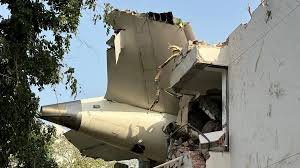New Delhi: The Supreme Court of India has observed that no one should blame the chief pilot of the Air India Dreamliner that crashed in Ahmedabad on June 12, killing 260 people. The court said the incident was an unfortunate accident and emphasized that the 91-year-old father of the deceased pilot should not be subjected to any mental distress.
The bench comprising Justices Surya Kant and Joymalya Bagchi stated, “Even the preliminary report does not indicate any fault on the part of the pilot. It was an unfortunate accident, and the pilot should not be blamed.”
The remarks came during the hearing of a petition filed by Pushkaraj Sabharwal — father of the late Captain Sumeet Sabharwal — and the Federation of Indian Pilots, seeking a court-monitored investigation led by a former Supreme Court judge into the crash. The court has issued notices to the Centre and the Directorate General of Civil Aviation (DGCA).
During the hearing, senior advocate Gopal Sankaranarayanan, appearing for Pushkaraj Sabharwal, stated that the controversy began after a report by The Wall Street Journal cited unnamed government sources alleging pilot error in the crash. He argued that the report was biased and aimed at maligning India’s aviation reputation.
“Foreign media reports don’t concern us. No one in India believes it was the pilot’s fault,” Sankaranarayanan told the bench. Sabharwal’s father expressed anguish that his late son’s reputation was being unfairly attacked.
Justice Bagchi observed that if the petitioner was disturbed by the foreign publication, he was free to file a case in a U.S. court. “We understand your anxiety, but there’s a clear difference between public perception and factual reality,” the judge added.
The judges read from a section of the Aircraft Accident Investigation Bureau’s (AAIB) preliminary report released on July 12, which, they noted, made no suggestion of wrongdoing by the pilot. “The report merely refers to a cockpit conversation — one pilot asked if the fuel was cut off, and the other replied no. There’s no indication of fault or negligence,” Justice Bagchi clarified.
Sankaranarayanan further pointed out that the crash should be viewed in the broader context of recurring safety issues involving Boeing aircraft worldwide. “We are a nation of 1.42 billion people, and none believes the pilot was at fault. Whatever the cause of the tragedy, it wasn’t the pilots. We only seek an independent investigation,” he said, adding that the preliminary report lacked impartiality.
Pushkaraj Sabharwal urged the court to ensure a fair and transparent probe, noting that his son had an impeccable career spanning over 30 years, logging more than 15,600 flying hours — including 8,596 on the Boeing 787-8 — without any incidents or disciplinary records.
The petition, filed on October 10 through A&P Chambers, named the Ministry of Civil Aviation, DGCA, and AAIB as respondents. It sought the formation of an independent committee including aviation and technical experts to identify the true cause of the crash. The plea argued that an incomplete or biased investigation would endanger future passengers, weaken aviation safety, and violate Article 21 of the Constitution, which guarantees the right to life.




